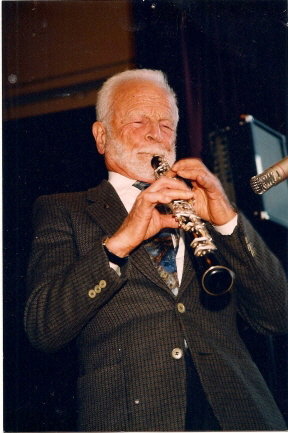|
Gerald Fried
The son of Ukrainian and Polish Jewish immigrants, Gerald Fried was born February 13, 1928 in the Bronx, New York. His mother made him take piano lessons
because that’s what the cultural immigrants were supposed to do, and Fried later attended the High School of Music and Art in Harlem. Two of his teenage friends were Stanley Kubrick and Alex Singer, the latter
of whom served as Fried’s mentor. Fried studied oboe at The Juilliard School of Music, and he studied conducting with their staff conductor, which didn’t help much because they were trapped in the 19th Century and he was a 20th century musician.
Upon graduating in 1948, Fried played English horn with the Dallas Symphony, then got hired by the Pittsburgh Symphony before returning to the Dallas
Symphony as principal oboe. He had moved on to become principal oboe for The Little Orchestra Society in New York when, in the middle of their season, Kubrick asked him to come to Hollywood to work with him. Once in
Hollywood, Fried invited the head of every big studio music department to attend his recording sessions, and although none of them showed up, they learned who he was. Fried scored five of Kubrick’s early
motion pictures, and he worked for Revue Studios until 1960. He became associate principal oboist for the Los Angeles Philharmonic from 1958 to 1959 and was also a studio oboist, doing work for El Cid and many other pictures. 
Among the films, documentaries, and TV-movies Fried scored are The Cabinet of Caligari, Cast a Long Shadow, The Chisholms,
Cruise Into Terror, Curse of the Faceless Man, Dino, The Flame Barrier, Gauguin in Tahiti, I Bury the Living, A Killer in the Family, Killer’s Kiss, The Killing, The Killing of Sister George, The Lost
Missile, The Mystic Warrior, Napoleon & Josephine: A Love Story, The Ordeal of Dr. Mudd, Paths of Glory, Rescue From Gilligan’s Island, The Return of Dracula, Roots: The Next Generation, Sex and the
Married Woman, The Silent Lovers, Terror in a Texas Town, Timbuktu, Too Late the Hero, The Vampire, and What Ever Happened to Aunt Alice?
The composer made a very long-lasting mark on episodic television, beginning with his jazzy scoring approach to the western series Shotgun Slade. His music can be heard in many famous TV series, among them Dynasty, Emergency!, Family Affair, Flamingo Road, The Flying Nun,
Gilligan’s Island, The Girl from U.N.C.L.E., Gunsmoke, It’s About Time, Lost in Space, M Squad, The Man from U.N.C.L.E., The Man Who Never Was, Mannix, Mission: Impossible, Riverboat, Star Trek (episodes Amok
Time, Catspaw, Friday’s Child, Paradise Syndrome, and Shore Leave), T.H.E. Cat, Wagon Train, and Whispering Smith.
Fried was nominated for a “Best Original Score” Oscar in 1975 for Birds Do It, Bees Do It, he won an Emmy along with Quincy Jones for the 1977
miniseries Roots, and he has been nominated for or won many other music awards. Some of his concert works include “Time Travel for Oboe and
Orchestra,” “Omnia Ad Dei Gloriam (or, Les the Least Straightens the Lord),” “The Chess Game” for string quartet, oboe, and flute, “Roots Suite,” “Mystic Warrior Suite,” “Star Trek Suite for Piano and Oboe,” and
“Rock of Angels.”
He joined ASCAP in 1957, was a member of the Board of Governors of the
Motion Picture Academy, and was an executive of the TV Academy. From 1984 to 2000 he taught the master class in composing and conducting motion picture music for UCLA, and in 1992 he was chosen Best Teacher
of the Year. Fried received a Lifetime Achievement Award at the 2013 International Samobor Film Music Festival. He is also on file with the FBI for being a Socialist. The multi-instrumentalist plays oboe, English horn,
clarinet, saxophone, piano, guitar, and 5-string banjo.
|